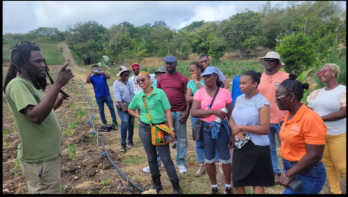Thirty-three (33) people, including farmers and Ministry of Agriculture
Extension Officers, benefitted from a two-day training on climate-smart
agriculture (CSA), including nature and ecosystem-based solutions to enhance
resilience.
The training was facilitated by Richard Rampersaud, Value Chain and Agri-
business Specialist from the Inter-American Institute for Cooperation on
Agriculture (IICA) Trinidad and Tobago Delegation.
The CSA farmer training was a part of the IICA-Caribbean Biodiversity Fund
(CBF) project to strengthen coastal and marine climate resilience, through
upland and coastal ecosystem-based adaptation and community engagement,
implemented in Antigua and Barbuda, Dominica, Saint Lucia, and Tobago.
The IICA-CBF EbA project is funded by the CBF EbA Facility, supported by
the German Ministry of Environment, Nature Conservation, and Nuclear
Safety and the International Climate Initiative (IKI).
The classroom and practical field CSA sessions shared information and simple
tools to help farmers to better recognize and differentiate climate hazards from
non-climate stressors which may compromise exposure and vulnerability of
their farming operations. A new and simple ‘SELFIE’ hazard-based and color-
coded tool was introduced to farmers to help them self-assess the climate
hazards and other farming challenges they face, and score their vulnerability,
impact readiness, and adaptive capacity. It was designed to also be useful to
farmers with literacy challenges.
The practical session took place at the Ras Freeman farm, a local producer
group with a mixed production system of cannabis, vegetables, and fruit trees.
Based on the ‘SELFIE’ tool, participants were able to relate to the importance
of situational awareness, by identifying hazards on their farm and its
immediate surroundings. Planting vetiver grass was demonstrated as a good
practice to stabilize the soil, below a newly built greenhouse, to be used to
produce the group’s seedlings. This demonstration reinforced the IICA-CBF
EbA project’s objective to promote nature-based solutions as an integral part
of the toolkit for resilient and sustainable farming systems.


